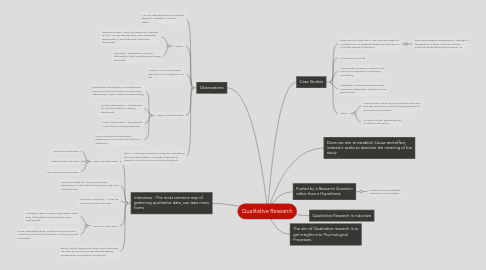
1. Interviews - The most common way of gathering qualitative data, can take many forms
1.1. Types of Interviews
1.1.1. Structured Interview
1.1.2. Unstructured Interview
1.1.3. Semi-structured Interview
1.2. Interviewer Effects : responses by the interviewee to the attitude, behavior, age, sex, race/ethnicity
1.3. Interview Schedule : A plan for conducting the interview
1.4. Biases in Interviews
1.4.1. Participant Bias: People might adjust what they if they think it would seem more appropriate
1.4.2. Social Desirability Bias: People want to present a positive picture of themselves, so they may not be truthful
1.5. Ethics: still go by general rules, and interviews can also be more personal and distressing. Professional competence is required
2. Observations
2.1. Aims to describe behavior without trying to establish a cause & effect
2.2. Biases
2.2.1. Researcher Bias: What the researcher expects to find, can be dissolved by inter-researcher observation (More than one researcher observing)
2.2.2. Reactivity : Participants may act differently if they know they are being observed
2.3. Mostly occur in naturalistic settings, but can happen in a lab
2.4. Types of Observation
2.4.1. Participant Observation: The researcher becomes a part of what he is observing, attempting to get a better understanding
2.4.2. Covert Observation : Participants do not know they are being observedd
2.4.3. Overt Observation : Participants know they are being observed
2.4.4. Non-Participant Observation: Researcher is not a part of what he is observing
2.5. Ethics : Informed Consent is required, debriefing after the observation, is usually proposed to research committees to protect participants
3. Case Studies
3.1. Produces rich data which can provide insight to a phenomena or individual behavior, focuses on a limited aspect of behavior
3.1.1. Describes people's experiences, feelings or thoughts on a topic, and can include measurements like blood pressure, IQ
3.2. Grounded in real life
3.3. Not exactly a research method, but more of an approach to studying something
3.4. Reliability is low because the results cannot be replicated, and can not be generalized
3.5. Ethics
3.5.1. Case studies can bring out more personal info, and the researcher must be very protective of participant information
3.5.2. All other ethical guidelines are to still be adhered to
